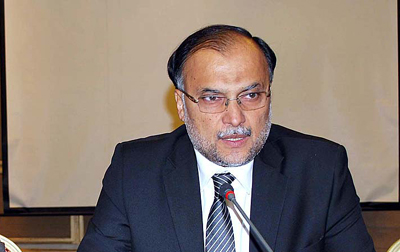Federal Minister for Planning, Development, and Special Initiatives, Ahsan Iqbal, reaffirmed the government’s unwavering commitment to the socio-economic transformation of Balochistan and the broader national economy during the “Uraan Pakistan Balochistan Consultative Workshop” held in Quetta. The event was organized by the Ministry of Planning in collaboration with the Government of Balochistan.
In his keynote address, Ahsan Iqbal declared that Pakistan is ready for its “fourth take-off” towards progress by strengthening the economy, enhancing exports, and ensuring national unity, political stability, and continuity of policies. He emphasized, “Political instability has held Pakistan back. No country can progress without continuity of policies.”
Reflecting on past achievements from 2013 to 2018, he cited the restoration of peace, reduction of 18-hour electricity shortages, improved law and order, and construction of extensive road networks in Balochistan. Highlighting the transformation of connectivity, he noted, “There was no proper road linking Gwadar to Quetta in the past. Now, improved connectivity has boosted local business and employment,” referencing the 650-kilometer highway that reduced travel time from 36 hours to just 8.
The Minister paid tribute to the sacrifices of Frontier Works Organization (FWO) personnel who laid down their lives during development projects. “Terrorists oppose such projects because they fear an educated and aware society,” he said, condemning hostile forces resisting Balochistan’s progress.
Launching the Uraan Pakistan 2035 Vision, Ahsan Iqbal outlined its five pillars: export-led growth, IT sector development, climate resilience and water security, renewable energy expansion, and the uplift of the country’s poorest districts. He stressed that under this initiative, the federal and Balochistan governments will modernize infrastructure, education, healthcare, agriculture, and mining to “lift the people of Balochistan out of darkness and into the light of development.”
Specific projects under Uraan Pakistan include the dualization of the Chaman-Quetta-Karachi highway, integration of Gwadar into the national power grid, promotion of renewable energy, and targeted development efforts in Balochistan’s 11 most underdeveloped districts out of the country’s 20 poorest.
Ahsan Iqbal highlighted Balochistan’s massive mineral potential, particularly with transformative projects like Reko Diq, describing it as “the first drop” of a wave of investment. He reaffirmed the government’s commitment to educating local youth, referencing the 5,000 scholarships provided for Balochistan and merged districts during the PML-N’s previous term, as well as international scholarships for Balochistani lawyers.
Education, human resource development, and nutrition were key focus areas. He stressed the need for urgent action to address stunted growth among children — currently affecting 38 to 40 percent — and announced a Rs 64 billion health project to make Pakistan hepatitis-free.
The Minister referenced a PricewaterhouseCoopers report from 2017, which projected Pakistan as one of the world’s top 20 economies by 2040 — a vision he said was interrupted by political instability but is once again within reach. He credited the current government’s reforms for stabilizing the economy, reviving the stock market (with the Pakistan Stock Exchange index rising from 40,000 to over 115,000 points), and achieving a historic current account surplus.
“Our future depends on human resources. Every ministry, province, and citizen must embrace this vision to make Pakistan a trillion-dollar economy,” he said. “Balochistan is not the periphery of Pakistan—it is its strength and its future.”
Chief Minister of Balochistan, Sarfaraz Bugti, along with provincial ministers, parliamentarians, and officials, also attended the workshop. Bugti praised the federal government’s development vision and extended special thanks to Prime Minister Shehbaz Sharif for key projects like the Kachhi Canal and the N-25 highway.
Concluding his remarks, Ahsan Iqbal called on all stakeholders to unite behind the Uraan Pakistan vision, saying, “Together, we will ensure a prosperous future for every citizen of Balochistan.”




